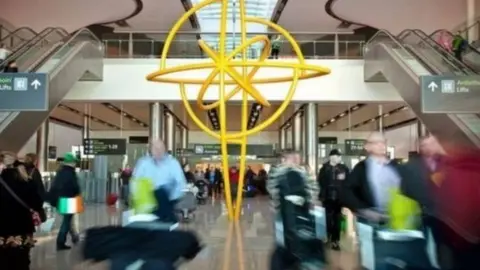Coronavirus: Tourists to Ireland 'must be able to isolate'
 Dublin Airport
Dublin AirportInternational tourists should not come to Ireland if they are unable to restrict their movements when they arrive, the Republic's foreign minister has said.
However, Simon Coveney said he does not think international flights should be prevented from landing in Ireland.
Irish authorities require anyone coming into the Republic of Ireland, apart from those from Northern Ireland, to self-isolate for 14 days.
That advice applies until 20 July.
On Monday, Mr Coveney said now is not a time for normal holidays involving tourists coming from abroad.
He said there is some evidence that some tourists in Ireland are not restricting their movements, adding that this had created a concern across the tourism industry in Ireland.
Mr Coveney said Irish people who are holidaying in Ireland want to know that they can holiday with their family safely.
He added that the Irish government is considering measures it can take to improve communications and to improve protocols at airports.
These include ensuring that the passenger locator form is moved online so a person can stand over the accuracy of the information given.
Mr Coveney said there is a legal requirement on people to fill out the passenger locator form accurately.
 PA Media
PA MediaHe said if a follow-up reveals people are not in the place where they said they would be staying, then they would have broken the law. He warned there are "severe penalties" for this.
Mr Coveney also said there are 200 to 250 people a day arriving from the US, which he said should be viewed in the context of 4,500 people a day coming into Ireland.
"The majority of these are Irish people coming home", he added.
Speaking at Monday evening's Department of Health briefing on Covid-19, acting Chief Medical Officer, Dr Ronan Glynn, said he did not think it was reasonable to shut down travel completely.
"I don't think it's reasonable in the context of a pandemic that could go on for many months to say we could shut down travel completely," he said.
"However from a public health point of view, we want to stop as much, if not all not essential travel, if at all possible."
Dr Glynn outlined that since the beginning of June, travellers to Ireland from Afghanistan, Bangladesh, France, Germany, UAE, India, Iraq, Malaysia, Portugal, Sudan, Sweden, Ukraine, UK, and the US have tested positive for Covid-19.
On Monday, the Irish Department of Health said there had been no further Covid-19 related deaths reported to them for the second day in a row. There were 11 confirmed additional cases.
From last week people arriving in Northern Ireland from more than 50 countries including France, Spain, Germany and Italy are no longer required to quarantine.
